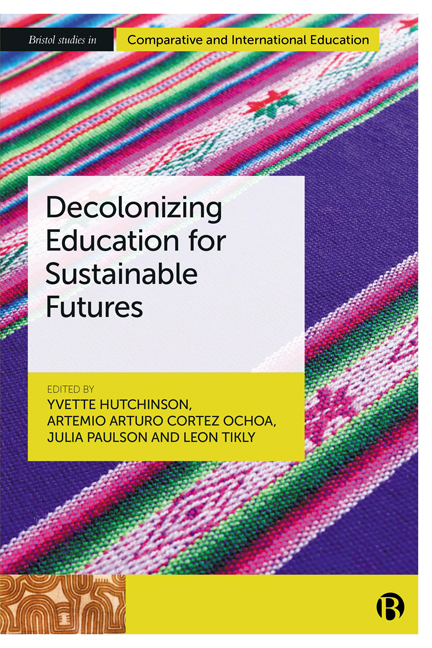Book contents
- Frontmatter
- Contents
- Series Editor Preface
- List of Figures and Table
- List of Abbreviations
- Notes on Contributors
- Acknowledgements
- Introduction
- PART I Connecting Decolonial and Sustainable Futures in Education
- PART II Decolonizing Education for Sustainable Futures: From Theory to Practice
- PART III Education’s Reparative Possibilities: Responsibilities and Reckonings for Sustainable Futures
- Conclusion
- Afterword
- Index
Introduction
Published online by Cambridge University Press: 18 January 2024
- Frontmatter
- Contents
- Series Editor Preface
- List of Figures and Table
- List of Abbreviations
- Notes on Contributors
- Acknowledgements
- Introduction
- PART I Connecting Decolonial and Sustainable Futures in Education
- PART II Decolonizing Education for Sustainable Futures: From Theory to Practice
- PART III Education’s Reparative Possibilities: Responsibilities and Reckonings for Sustainable Futures
- Conclusion
- Afterword
- Index
Summary
I play son huasteco, a Mexican folkloric music genre interpreted with adapted guitars and violins. Some characteristics of this music style include intricate melodic arrangements and singers’ high-pitch falsetto voices. In order to achieve such a high voice, it is common among son huasteco musicians to tune the instruments about a semitone below the most standard 440-ish frequency.
I was tuning my violin as we were putting the chapters of this book together and was reflecting on the two exercises. The problem is that available strings (nylon and metallic) in the region where this music is played are now typically made for European violins and guitars. Using these strings, it is unlikely that the sound huasteco musicians produce will ever achieve the brilliance and potential for which the strings they use were made. Nor are strings that huasteco musicians use the ones best suited for the brilliance and potential of huasteco music.
Several reflections can be drawn from this situation; the most evident is why aren't strings made for folkloric musicians, such as those from the huasteco community? What impact will that have in the long-term on the huasteco sound? Is there a danger that son huasteco diminishes as the easily available strings redefine the traditional sound? Have other son huasteco musicians noticed that they play with strings not made for their instruments and requirements?
Reflections on son hausteco, Artemio Arturo Cortez OchoaWhy a book on decolonizing education for sustainable futures?
These reflections, from Artemio Arturo Cortez Ochoa, son huasteco violinist and one of the editors of this book, connect to many of the themes explored in these pages. They serve to illustrate, for example, some of the complexities in ensuring sustainable futures, in this case the sustainability of a form of cultural expression and the histories and ways of life it embodies. They also illustrate the nature of what Maldonado-Torres (2007), Ndlovu-Gatsheni (2013; 2015) and many contributors to this book describe as ‘coloniality’, the enduring presences of colonial extraction and oppression in the postcolonial present.
- Type
- Chapter
- Information
- Decolonizing Education for Sustainable Futures , pp. 1 - 16Publisher: Bristol University PressPrint publication year: 2023



